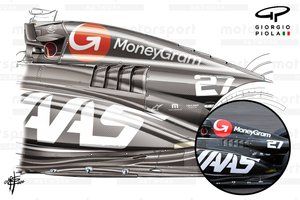The key details behind Mercedes' W14 F1 upgrade
Mercedes' much-vaunted Formula 1 upgrade has arrived in Monaco, with the team abandoning its zero-pod solution in favour of a design more akin to its rivals.

Photo by: Giorgio Piola
Giorgio Piola's F1 technical analysis
Giorgio Piola is the preeminent Formula 1 technical journalist. View our full selection of Giorgio's technical illustrative content
As expected, the new design takes inspiration from other solutions we have seen employed up and down the grid. However, there's clearly delineation in its design profile in order to integrate it with the W14's core design principles.
This has been made even more difficult when we consider the implications posed by the cost cap and resource restrictions.
In the past, teams may have considered a full-blown B-spec redesign and manufacture.
This is no longer an option though, so there's always going to be a considerable trade-off when shifting to a new concept, as not everything can be placed optimally.

Mercedes W14 technical detail
Photo by: Giorgio Piola
In this respect, there's one major feature of the zero-pod design that's been retained as part of the overhaul.
It is that the Side Impact Spar (SIS) fairing has been retained ahead of the main sidepod assembly. Moving it inside is not possible without the homologation of a new chassis, meaning the team has had to incorporate the fairing into the sidepod's revisions.
The winglet mounted below and on the outer extremity of the SIS fairing has also been retained but modified to better suit the flow characteristics required.
The SIS fairing itself is positioned to help to direct the airflow towards the inlet, which has been widened but is also shallower in order to create a more traditional undercut beneath it.
Thereafter the undercut is smoothed into a flatter surface profile, which is akin to the outgoing design in this section, albeit it is married to the new downwash ramp-style upper portion of the sidepod.

Mercedes W14 technical detail
Photo by: Giorgio Piola
This upper surface of the sidepod also retains some commonality with its predecessor, as an interchangeable louvred cooling panel resides on the top surface, allowing heat to be rejected based on the circuit's characteristics and the panel chosen.
The sidepod's downwash ramp also features the waterslide approach we've seen from others, with the design favoured by Mercedes more comparable with Alpine or McLaren's design rather than Aston Martin, owing to the height that's been allowed for the ramp section as it tapers towards the rear of the car.

Mercedes W14 front suspension comparison
Photo by: Uncredited
The updates introduced by Mercedes go way beyond just the sidepods though, with the changes made to the front suspension perhaps even more intriguing, given that they will have both aerodynamic and mechanical consequences.
This is the primary reason why the team has been prepared to run the gauntlet of introducing a large update package on the tight and barrier-lined streets of Monte Carlo, as one element of its package will not deliver the performance it is looking for without the other.
The main change is to the lead arm of the upper wishbone, as the inboard end now finds a home in the highest position possible on the forward corner of the chassis, rather than a few inches below.
This will obviously have implications in terms of the suspension's behaviour under certain modes, with dive being the most prominent. This will assist not only from a mechanical standpoint but also aerodynamically.
The change in position for the lead arm has also resulted in the team paying particular attention to the fairing's topology, with a section of it turned down to the oncoming airflow in order to better manage its behaviour thereafter (red arrow).
While what we have seen of the update package is already relatively extensive, there's still likely more to come, with a new floor also on the agenda in order to take advantage of the other changes.
Be part of Motorsport community
Join the conversationShare Or Save This Story
Related video
Subscribe and access Motorsport.com with your ad-blocker.
From Formula 1 to MotoGP we report straight from the paddock because we love our sport, just like you. In order to keep delivering our expert journalism, our website uses advertising. Still, we want to give you the opportunity to enjoy an ad-free and tracker-free website and to continue using your adblocker.



















Top Comments